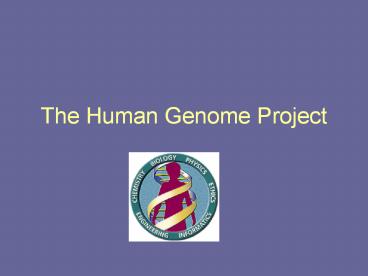The Human Genome Project - PowerPoint PPT Presentation
Title:
The Human Genome Project
Description:
The Human Genome Project What is the Human Genome Project? ... - store this information in databases. - develop tools for data analysis. - address the ethical, ... – PowerPoint PPT presentation
Number of Views:4294
Avg rating:3.0/5.0
Title: The Human Genome Project
1
The Human Genome Project
2
What is the Human Genome Project?
- U.S. govt. project coordinated by the Department
of Energy and the National Institutes of Health,
launched in 1986 by Charles DeLisi. - Definition GENOME the whole hereditary
information of an organism that is encoded in the
DNA. - Aims of the project
- - to identify the approximate 100,000 genes in
the human DNA. - - determine the sequences of the 3 billion bases
that make up human DNA. - - store this information in databases.
- - develop tools for data analysis.
- - address the ethical, legal, and social issues
that arise from genome research.
3
Cutting DNA
- DNA molecules from most organisms are much too
large to be analyzed,_at_ so they must first be cut
into smaller pieces by restriction enzymes._at_ - Many bacteria produce restriction enzymes that
cut DNA molecules into precise pieces, called
restriction fragments that are several hundred
bases in length. - Of the hundreds of known restriction enzymes,
each cuts DNA at a different sequence of
nucleotides.
4
Cutting DNA
- For example, the EcoRI restriction enzyme
recognizes the base sequence GAATTC.
5
Separating DNA
- Once DNA has been cut by restriction enzymes,
scientists can use a technique known as _at_gel
electrophoresis to separate and analyze the
differently sized fragments. _at_
6
Reading DNA
- _at_Lastly the strands are chemically dyed._at_
- The order of colored bands on the gel tells the
exact sequence of bases in the DNA.
7
Whose genome is being sequenced?
- the first reference genome is a composite genome
from several different people. - generated from 10-20 primary samples taken from
numerous anonymous donors across racial and
ethnic groups.
8
Benefits of Human Genome Project research
- - improvements in medicine.
- - microbial genome research for fuel and
environmental cleanup. - - DNA forensics.
- - improved agriculture and livestock.
- - better understanding of evolution and human
migration. - - more accurate risk assessment.
9
How is each area benefited specifically by the
Human Genome Project?
- Improvements in medicine improved diagnosis of
disease. - Microbial research new energy sources, bio
fuels. - DNA forensics identifying potential suspects at
a crime scene. - Agriculture more nutritious produce.
- Evolution and human migration study migration of
different population groups based on female
genetic inheritance. - - Risk assessment reduce the likelihood of
heritable mutations.
10
Ethical, legal and social implications of the
Human Genome Project
- fairness in the use of genetic information.
- privacy and confidentiality.
- psychological impact and stigmatization.
- genetic testing.
- reproductive issues.
- education, standards, and quality control.
- commercialization.
- conceptual and philosophical implications.
11
What are the implications of the Human Genome
Project specifically to each of these areas?
- Some questions to consider
- Fairness and privacy who should have access to
your genetic information? - Psychological stigmatization how does knowing
your predisposition to disease affect an
individual? - Genetic testing should screening be done when
there is no treatment available? - Some other issues
- Reproductive issues use of genetic information
in decision making. - Clinical issues implementation of standards and
quality control measures in testing procedures.
12
This powerpoint was kindly donated to
www.worldofteaching.com http//www.worldofteac
hing.com is home to over a thousand powerpoints
submitted by teachers. This is a completely free
site and requires no registration. Please visit
and I hope it will help in your teaching.































